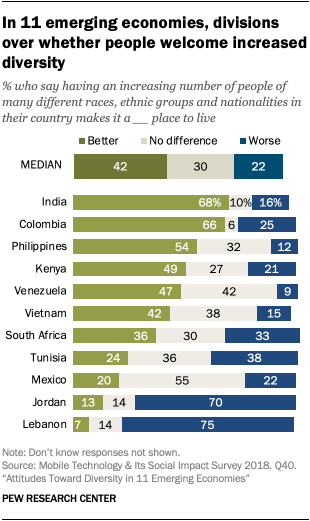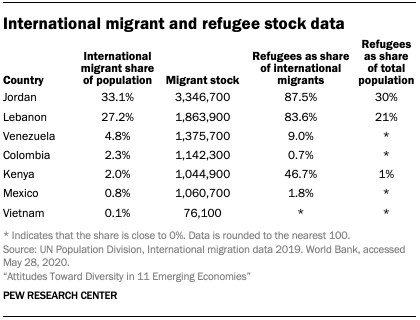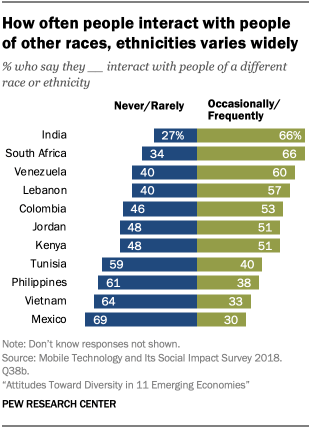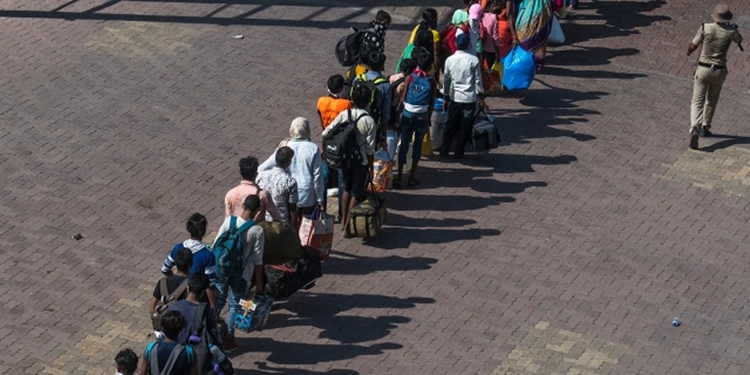Prior to the novel coronavirus outbreak, many emerging economies grappled with challenges linked to diversity and changing demographics, a new Pew Research Center report finds, but people who interact more with those who are different from them – whether religiously, ethnically or racially – tend to be more positive about societal diversity.
Here you can find the full study.
Across the 11 countries surveyed (Colombia, India, Jordan, Kenya, Lebanon, Mexico, the Philippines, South Africa, Tunisia, Venezuela and Vietnam), more people said their countries are better off thanks to the increasing number of people of different races, ethnic groups and nationalities who live there (median of 42%) than said their country is worse off (22%), and a large minority said these changes make no difference (30%).

But there was significant variation across the countries studied. For example, in Jordan and Lebanon, both heavily affected by the Syrian refugee crisis, seven-in-ten or more said their country has been made worse by increasing diversity. In contrast, around half or more in Kenya (49%), the Philippines (54%), Colombia (66%) and India (68%) said their country is improved by these demographic changes.
Other key findings from the survey include:
Interacting with people of different racial and ethnic backgrounds is uncommon in some countries. More than half in India, South Africa, Venezuela, Lebanon and Colombia said they occasionally or frequently interact with people of ethnic groups or races different than their own. On the other hand, majorities in Tunisia, the Philippines, Vietnam and Mexico reported that they rarely or never have these kinds of experiences.
Generally, more contact is related to more positive opinions of other racial, ethnic and religious groups within a given society – as well as more favorable views of increasing diversity, more broadly. For example, people who said they regularly interact with those whose religious views are different from theirs tend to see all religious groups within the society in more positive terms and to think that increasing diversity in their country is a good thing. The same is true when it comes to interactions with people of different racial and ethnic backgrounds.

Interacting with people of different racial and ethnic backgrounds is related to more positive views of migrants and refugees. Across the seven countries surveyed on favorability of migrants and refugees, interactions with people of racial or ethnic groups different than one’s own was related to less negative feelings toward refugees and migrants.
Kenyans tend to have favorable opinions of refugees in their country. A roughly six-in-ten (58%) majority of Kenyan adults had favorable views of refugees. Younger Kenyans were more favorable than older Kenyans toward refugees. Around two-thirds of adults ages 18 to 29 had favorable views of refugees living in the nation, compared with fewer than half of those 50 and older (46%).
Mexicans and Colombians see migrants in their country in a negative light. Around half (48%) of Mexicans gave unfavorable ratings to Central Americans fleeing to Mexico. Younger people had more favorable views of Central American migrants in Mexico than those ages 50 and older. More than half of Colombian adults (54%) said they held an unfavorable view of migrants in Colombia; 42% had a favorable opinion.
Lebanese see increasing diversity harming their country. Three-quarters of Lebanese said having an increasing number of people of many different races, ethnic groups and nationalities in their country makes it a worse place to live. And 70% of Lebanese also had an unfavorable view of refugees living in their country.

In Jordan, public attitudes about refugees are complex. Although Jordanians said having increasing numbers of people of other races and nationalities makes their country a worse place to live, they nonetheless held largely positive views of the refugees living within their boundaries.

